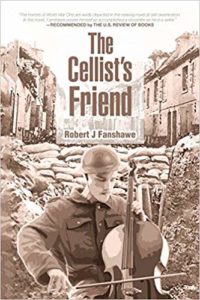Title: The Cellist’s Friend
Author: Robert J Fanshawe
Publisher: AuthorHouse
ISBN: 978-1-5462-8833-6
Pages: 195
Genre: Fiction/War/Romance
Reviewed by: Holly White
Hollywood Book Review
 Author Robert J. Fanshawe has a way with words that will draw you in from the first paragraph – from the first sentence, actually. His hero, Benjamin Routledge, narrates this fascinating tale with a tone which is friendly and self-knowing, yet at the same time, a bit mysterious. He is letting the reader learn about him as he addresses the task himself. I didn’t realize how invested I was until about halfway through it occurred to me by using Routledge as the narrator, Fanshawe could in a clever way, pull a “Sunset Boulevard” writing technique or “The Sixth Sense” on the reader, and we would find out at the end that Routledge was dead and his narration was some sort of conceit. I don’t think a spoiler alert is necessary to assure you that he is not. He is more alive at the end than in any scene that precedes it.
Author Robert J. Fanshawe has a way with words that will draw you in from the first paragraph – from the first sentence, actually. His hero, Benjamin Routledge, narrates this fascinating tale with a tone which is friendly and self-knowing, yet at the same time, a bit mysterious. He is letting the reader learn about him as he addresses the task himself. I didn’t realize how invested I was until about halfway through it occurred to me by using Routledge as the narrator, Fanshawe could in a clever way, pull a “Sunset Boulevard” writing technique or “The Sixth Sense” on the reader, and we would find out at the end that Routledge was dead and his narration was some sort of conceit. I don’t think a spoiler alert is necessary to assure you that he is not. He is more alive at the end than in any scene that precedes it.
The Cellist’s Friend takes place during World War I. It opens with a firing squad taking aim at Routledge’s friend, a man who goes by the nickname of Cello because of his musical talents. Following a court-martial, Routledge is a witness at the execution. What Routledge perceives as his failure to speak up for his friend is the leitmotif for the rest of the story. He considers himself to be a coward. While we see him behave as the opposite, it is the personal demon which haunts him.
Fanshawe does not go easy on the ugliness of war. “A soldier cannot predict or seek knowledge of the future, even the future of the next few seconds.” “This war was sometimes so senseless and mean, where tiny things became massive things, like the shooting of an innocent man, were tiny and insignificant.” He fills pages with smells and descriptions which are disturbing and lingering. He takes you into the trenches and into the latrines and into the minds and conversations of soldiers who are half-mad with despair.
When Routledge is seriously wounded and taken from the battlefield to the hospital, Fanshawe writes, “Then, of course, the pain was always worst at night, when you couldn’t get comfortable and you knew there wouldn’t be any pain relief probably till morning, when someone else perhaps had been taken from his bed, the silent ritual of the dead.”
While in the hospital, Routledge forms a pen-pal relationship with the wife of a Jamaican man who had saved him during the war. It is a sweet and cordial friendship that appears to bring Routledge back to life. The fact that she is black seems to excite him and we can see that he is girding himself for the next kind of battle that he may be facing. Interracial dating was a great taboo at the time. Upon finding out that her husband, and his savior, has died, he lets his imagination run free. It is unclear whether this woman knows that he is white or if it would have made any difference in the telling. It clearly makes no difference when Pearl makes her trip to London and they finally meet in person.
The Cellist’s Friend is purportedly the first in a trilogy for Fanshawe. He has flawlessly ensnared us into wanting to read what he produces next. He has created genuine characters which we care about. If only the world would heed Routledge’s words: “Stopping the war was simple – put down your weapons.”

